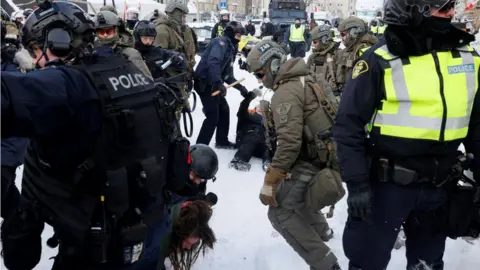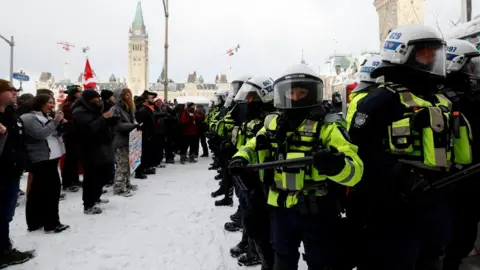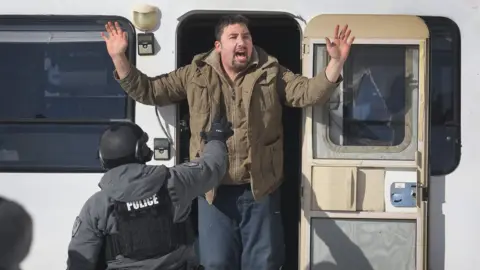Canada protests: Police push back demonstrators in Ottawa
Police in Canada's capital Ottawa have cleared a main protest site in front of parliament that had been occupied by demonstrators for over three weeks.
More than 170 people have been arrested and 38 vehicles seized as officers, some on horseback, continued the second day of a massive crackdown.
Some protesters who resisted were thrown to the ground and had their hands zip-tied behind their backs.
Police said, however, that operations were ongoing in Ottawa.
"We won't commit to any end time," interim police chief Steve Bell said, adding "We are in this until it is over."
Mr Bell said that some protesters had moved from the heart of the protest area near Parliament Hill to surrounding neighbourhoods and that those areas would also be cleared.
It is one of the biggest police operations in Canada's history.
Police confirmed on Twitter they had used pepper spray on some protesters, saying: "You will have seen officers use a chemical irritant in an effort to stop the assaultive behaviour and for officer safety."
The crackdown on the self-styled Freedom Convoy began on Friday morning, when hundreds of police, some holding riot batons, descended into the protesters' encampment in downtown Ottawa.
But some protesters refused to leave, forming a line in front of approaching officers, linking arms and singing the national anthem, O Canada.
"PROTESTORS: We told you to leave," Ottawa Police tweeted. "We gave you time to leave. We were slow and methodical, yet you were assaultive and aggressive with officers and the horses.
"Based on your behaviour, we are responding by including helmets and batons for our safety."
 Reuters
ReutersPolice said some of those arrested had been wearing body armour and carrying fireworks and smoke grenades. And they criticised people for bringing children to the protest, saying anyone bringing a minor to an illegal protest site could be jailed for five years or fined.
Police have also accused protesters of launching gas canisters at officers.
A statement released on Saturday by Freedom Convoy organisers said they had asked remaining truckers to move from the protest site "to avoid further brutality".
Mr Bell said police had the "mechanisms" to review all arrests to ensure they were made according to procedure but that protesters had repeatedly been warned they would be forcibly removed if they chose not to leave.
 Reuters
ReutersHe also said that the investigation into the protests was not over and "will go on for months to come".
"We will hold people accountable for taking our streets over," he said.
Ottawa police set up almost 100 police check-points on Thursday around the main protest site as well as a large business and residential district to prevent more protesters from entering the area.
The protest began in January as a truck convoy headed to Ottawa to oppose a vaccine mandate for truckers crossing the US-Canada border and grew into a broader opposition to pandemic restrictions and Mr Trudeau's government, with supporting protests across the country.
Authorities last weekend cleared the most economically damaging blockade - a bridge linking Windsor, Ontario, with the US state of Michigan. Trucker protests at other border crossings in Coutts, Alberta, Surrey, British Columbia, and Emerson, Manitoba, ended this week.
Only the blockade in Ottawa, which began on 28 January and paralysed a large part of the city centre, remained.
Parliamentarians returned on Saturday to Canada's House of Commons - after cancelling Friday's sitting because of the nearby police action - to debate the decision by Prime Minister Justin Trudeau this week to invoke a never-before-used emergencies law to resolve the protests.
The law grants government added powers in times of crisis. It has been used to impose bans on public assembly in some areas of Ottawa and has prohibited travel to the protest zone, among other measures.
 Getty Images
Getty ImagesOn Saturday, the federal government said it had frozen at least 76 bank accounts linked to the protests representing C$3.2m ($2.5m; £1.8m) under the temporary emergency measures.
Earlier in the week, an Ontario Superior Court Judge approved a court order freezing millions of dollars - including some held in crypto-currency - raised from around the world to support the protests.
The freeze is part of a class-action lawsuit filed by residents and business owners in Ottawa against protest organisers and participants, as well as against all those who donated funds after 4 February.
